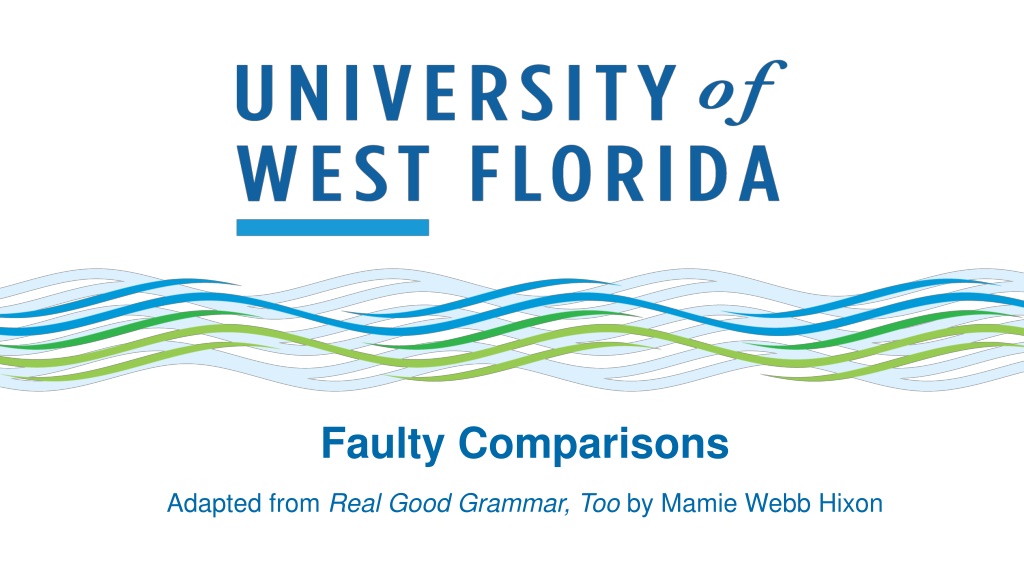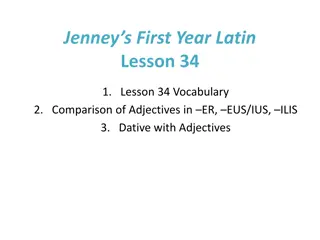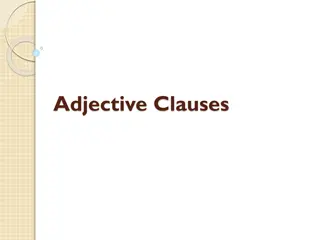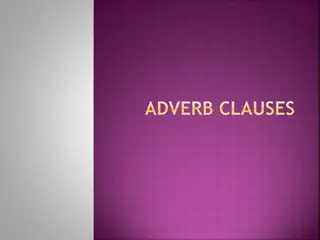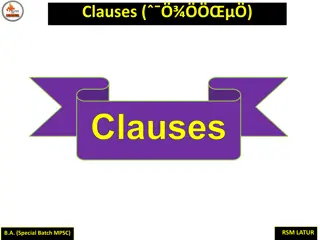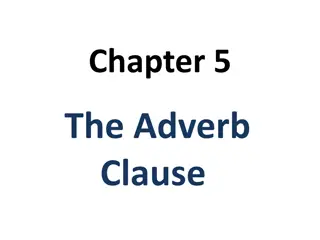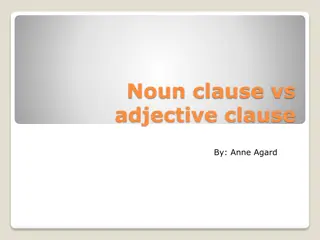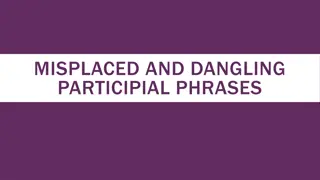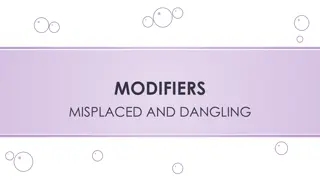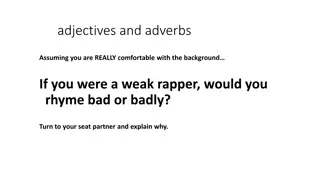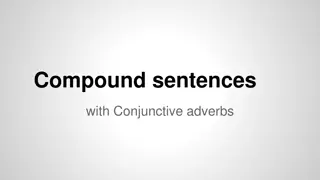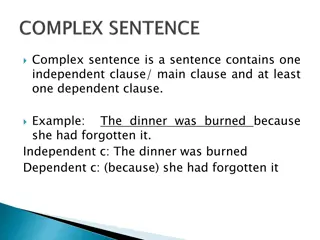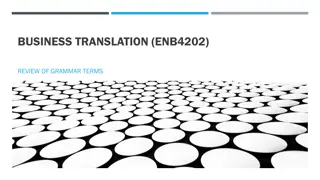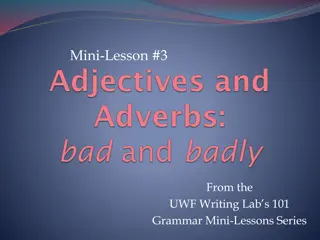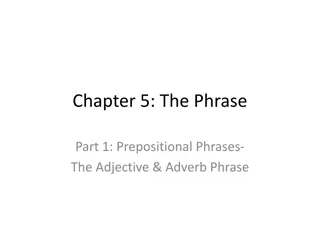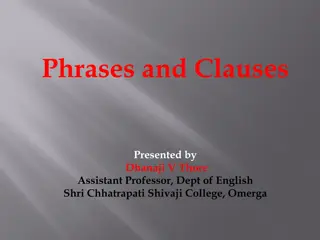Correct Usage of Adjective and Adverb Comparisons
Learn how to correctly compare adjectives and adverbs using the positive, comparative, and superlative forms. Avoid common mistakes like double comparisons and ensure you use the right form based on the number of items being compared. Improve your grammar skills with clear examples and revisions for better understanding.
Download Presentation

Please find below an Image/Link to download the presentation.
The content on the website is provided AS IS for your information and personal use only. It may not be sold, licensed, or shared on other websites without obtaining consent from the author.If you encounter any issues during the download, it is possible that the publisher has removed the file from their server.
You are allowed to download the files provided on this website for personal or commercial use, subject to the condition that they are used lawfully. All files are the property of their respective owners.
The content on the website is provided AS IS for your information and personal use only. It may not be sold, licensed, or shared on other websites without obtaining consent from the author.
E N D
Presentation Transcript
Faulty Comparisons Adapted from Real Good Grammar, Too by Mamie Webb Hixon
Faulty Comparisons DEGREES OF ADJECTIVES AND ADVERBS (MODIFIERS) POSITIVE COMPARATIVE friendly friendlier lonely lonelier eager more eager efficient more efficient good better bad worse SUPERLATIVE friendliest loneliest most eager most efficient best worst
Use Use - -er er or or - -est or two syllables. or two syllables. est for most adjectives with one for most adjectives with one I am more lonely than she is. Lonely has two syllables. Instead of saying more lonely, say lonelier. Revised: I am lonelier than she is.
Use Use more more or or most than two syllables. than two syllables. Benny is the enthusiasticest student Dr. Johnson has. Yuck! Enthusiastic has five syllables. As you can tell, adding est to a word that long doesn t even sound right. Revised: Benny is the most enthusiastic student Dr. Johnson has. most for most adjectives with more for most adjectives with more
Double comparisons occur when the degree of the Double comparisons occur when the degree of the modifier is changed incorrectly by adding both modifier is changed incorrectly by adding both - - er er and more or and more or - -est est and most. and most. Michael is more friendlier than his sister. More is a comparison word; adding er to the end of a word also signals a comparison. We re making only one comparison here the comparison between Michael s level of friendliness and his sister s level of friendliness. Just use one comparison word. Revised: Michael is friendlier than his sister.
Use the comparative form to compare two things Use the comparative form to compare two things or people. or people. Of the two textbooks, the oldest edition is the best. There are only two things in this comparison. Instead of using the superlatives oldest and best to compare them, use the comparatives older and better. Revised: Of the two textbooks, the older edition is better.
Use the superlative form to compare three or more Use the superlative form to compare three or more things or people. things or people. Of the four textbooks, the older edition is the better. There four things in this comparison. Instead of using the comparatives older and better to compare them, use the superlatives oldest and best. Revised: Of the four textbooks, the oldest edition is best.
The superlative is also used incorrectly when it is The superlative is also used incorrectly when it is combined with combined with any other any other, meaning "only one" or with with all the others, thereby excluding the all the others, thereby excluding the compared item from its category. compared item from its category. , meaning "only one" or Montreal is the largest of any other city in Canada. The use of any other in this sentence suggests that Montreal is the largest of one city. Revised: Montreal is the largest of all the cities in Canada.
Illogical comparisons occur when there is an implied Illogical comparisons occur when there is an implied comparison between two things that are not actually comparison between two things that are not actually being compared or that cannot logically be compared. being compared or that cannot logically be compared. The interest rate at a loan company is higher than a bank. How high is a bank? Let s guess the bank in question is about 30 feet tall. This comparison would mean the interest rate at a loan company is more than 30 feet tall. That comparison doesn t make sense. We need to compare the interest rate at a loan company with the interest rate at a bank. Revised version 1: The interest at a loan company is higher than that at a bank. Revised version 2: The interest at a loan company is higher than a bank's.
Ambiguous comparisons occur when elliptical Ambiguous comparisons occur when elliptical words (those omitted) create for the reader more words (those omitted) create for the reader more than one interpretation of the sentence. than one interpretation of the sentence. I like Nancy better than you. What comparison are we making here? Is it a comparison between how much I like Nancy and how much I like you, or is it a comparison between how much I like Nancy and how much you like Nancy? Let s clarify what we are comparing. Revised version 1: I like Nancy better than I like you. Revised version 2: I like Nancy better than you do.
Incomplete comparisons occur when the basis of Incomplete comparisons occur when the basis of the comparison (the two categories being the comparison (the two categories being compared) is not explicitly stated. compared) is not explicitly stated. Watching television is more interesting. Watching television is more interesting than what? We need to complete the comparison Revision: Watching television is more interesting than watching paint dry.
Do not omit the words Do not omit the words other comparing one thing or person with a group of which comparing one thing or person with a group of which it/he is a part. it/he is a part. other, , any any, or , or else else when when Joanna writes better than any student in her class. Joanna is a student in the class. Does she write better than herself? We need to add language to show that Joanna is being compared to other students in a group in which Joanna is included. Revised: Joanna writes better than any other student in her class. If the superlative is intended, revise the sentence this way: Joanna is the best writer in her class.
Do not omit Do not omit as as when making a point of equal or when making a point of equal or superior comparison using superior comparison using as . . . as. as . . . as. The University of West Florida is as large or larger than the University of North Florida. To complete the comparison, we need the second as. Revised: The University of West Florida is as large as or larger than the University of North Florida.
When using the words one of to make a When using the words one of to make a comparison, be sure to get the number of things comparison, be sure to get the number of things being compared right. being compared right. This is one of the best, if not the best, hamburger joint in this country. The problem is that only one hamburger joint seems to be the object of comparison.One of the best requires the plural hamburger joints, not the singular hamburger joint. Revised: This is one of the best hamburger joints in this country, if not the best.
